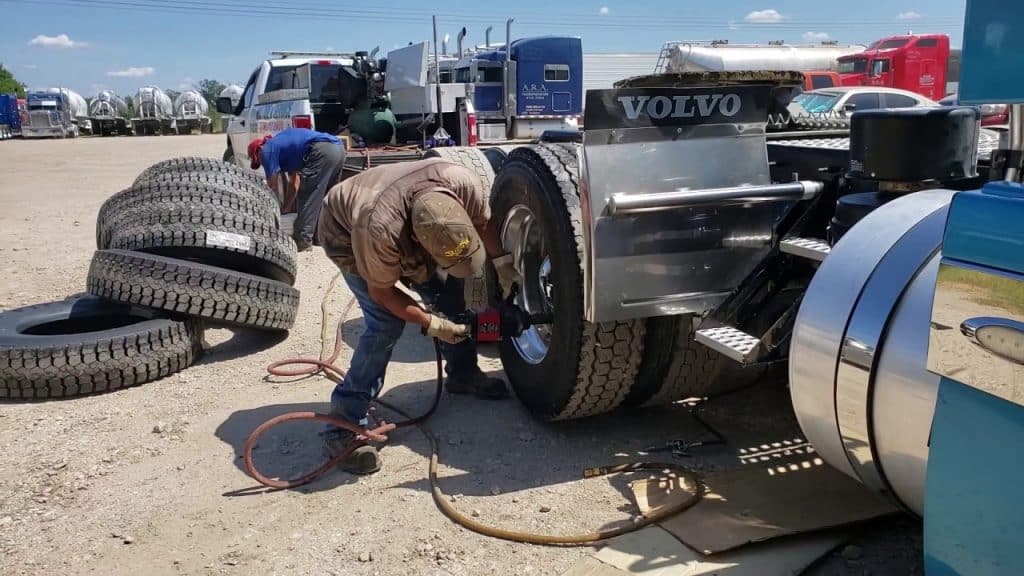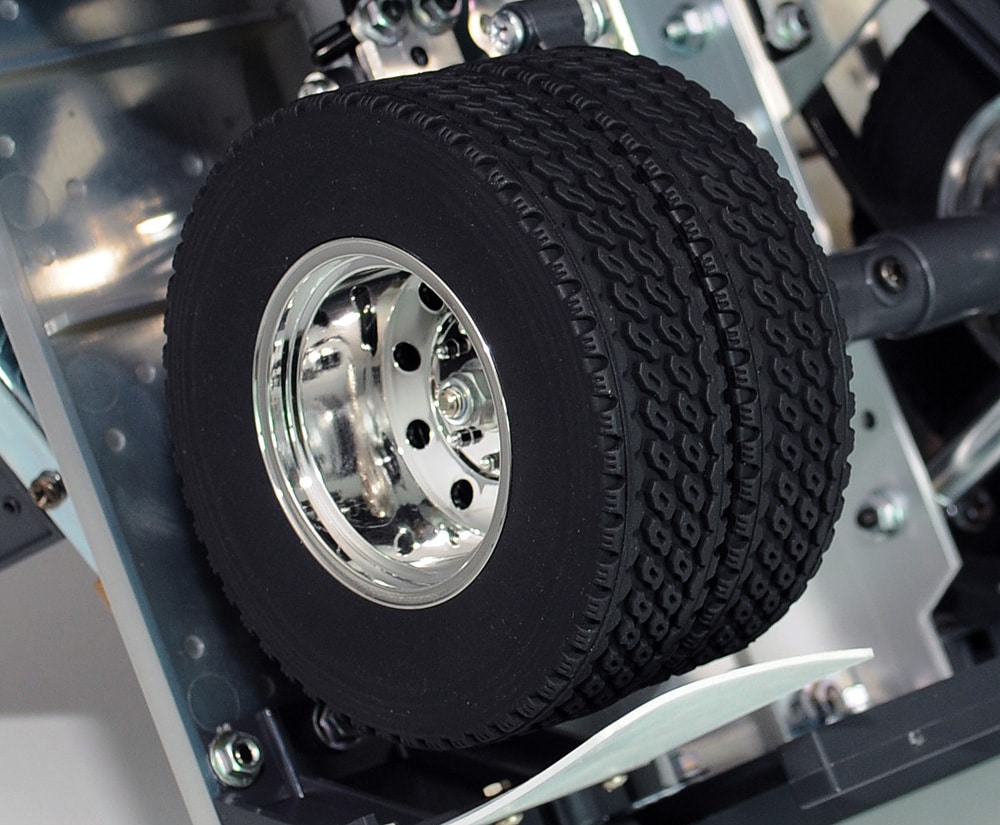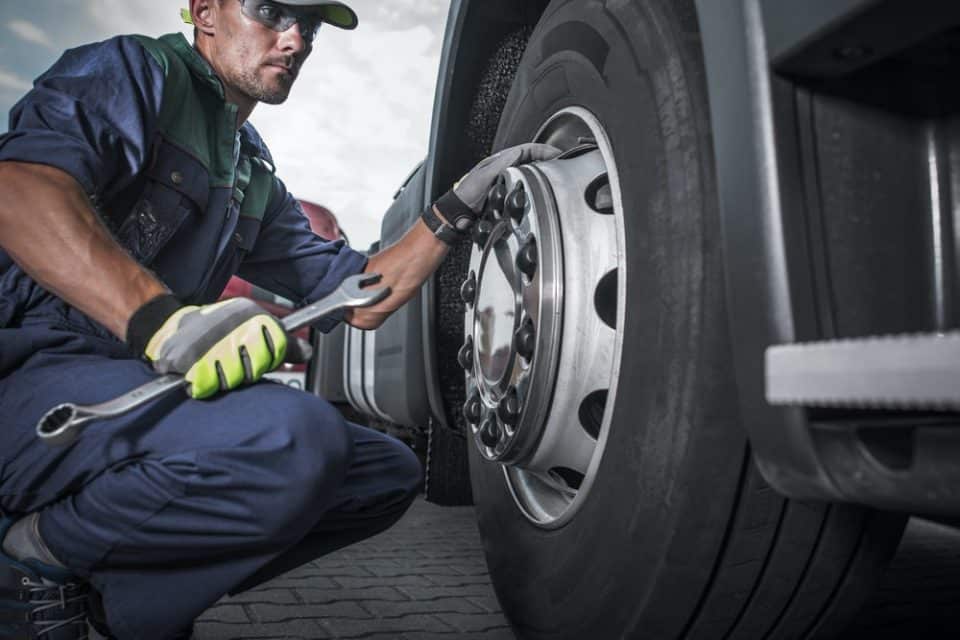When it comes to fleet maintenance, commercial semi truck tires are one of the most important components to focus on. To get from A to B quickly and efficiently, your tires must be in good shape.
Due to all the wear and tear they experience, it’s not surprising that semi truck tires need to be maintained and replaced often. If you’re a new owner operator or fleet owner, it’s important to understand the types of tires available, common sizes and the features to look for when shopping for tires.
Types Of 18 Wheeler Tires
Steer Tires
One of the most important tires on an 18 wheeler. Steer tires ensure that your truck is moving in the right direction, but they also provide traction.
These tires are constantly working against dozens of other tires on the truck, and they all want to move in different directions. Not surprisingly, they often show signs of wear and tear sooner than other tires. Tire manufacturers build in extra resistance to help account for this.
Steer tires must have tough sidewalls to handle tight corners and keep the truck straight. They also have a rib tread design to help with water evacuation.
There’s no question that steer tires are unique, and they take on a big load. In fact, they carry the greatest loads on the truck – up to 2,000 additional pounds. Steer tires can be rated for up to 7,000 pounds and may require tire pressure of 120 psi.
Drive Tires
A truck’s drive tires are the real workhorses of an 18-wheeler. These tires are designed for drive axles, and their purpose is to maximize traction. Drive tires have a siped or lug-type tread.
Dedicated drive tires will have a more aggressive tread pattern than steer tires.
Trailer Tires
Trailer tires just go along for the ride, but they still have an important job. More so than most other tires on a big rig, trailer tires take a beating. They run over curbs and get scraped along the pavement.
Unfortunately, trailer tires are often overlooked by truckers and even maintenance crews.
True trailer tires are typically rib tires. However, it’s not uncommon for fleet owners to move their steer and drive tires to the trailer position before retreading.
Understanding Common Semi Truck Tire Sizes

The sizing of semi truck tires can be confusing to those who are new to the industry. Seeing the size 295/75R22.5 may look like a bunch of gibberish, but each number and letter represents a different aspect of the tire’s size.
Let’s take a closer look at each component and what it means:
Tire Width – 295
The width of the tire is listed as either inches or millimeters. In our example, the number 295 should clearly indicate that the measurement is in millimeters – 295 inches would be over 24 feet wide!
Aspect Ratio – 75
The aspect ratio – in this case, 75 – indicates the percentage of the section height divided by width. A higher aspect ratio indicates a taller tire sidewall.
Tire Type – R
The letter after the aspect ratio represents the tire type. In this case, the R stands for radial construction. Less common types include B, which stands for belted bias, and D, which stands for diagonal bias.
Diameter – 22.5
The last number in the tire size is the wheel rim diameter. Typically, this number is measured in inches.
Load Index and Speed Rating
Some tire sizes will also include the load index, which is represented as a two-digit number and a single letter (e.g. 119U). The letter represents the tire’s speed rating.
Just as the name suggests, the load index represents how much weight the tire can support. The higher the number, the greater the load the tire can support.
The tire’s speed rating in the example above is 124 MPH.
Here’s a list of the maximum speed ratings for tires:
- L: 75 MPH
- M: 81 MPH
- N: 87 MPH
- P: 93 MPH
- Q: 99 MPH
- R: 106 MPH
- S: 112 MPH
- T: 118 MPH
- U: 124 MHPH
- H: 130 MPH
- V: 149 MPH
- Z: 149+ MPH
Common Semi Truck Tire Sizes
According to the U.S. Tire Manufacturer’s Association, the most common semi truck tire sizes include:
- 295/75R22.5
- 275/80R22.5
- 225/70R19.5
What to Consider When Buying Semi Truck Tires

When shopping for semi truck tires, there are several things that need to be considered:
Fuel Efficiency
Semi trailer tires play an important role in fuel efficiency. In fact, some estimates suggest that tires account for up to 50% of the rig’s fuel efficiency. Drive and steer tires have the biggest impact.
Most modern truck tires have low rolling resistance, which means that the engine doesn’t need to provide as much force to keep the truck moving at speed. Tires with low rolling resistance can help you save up to 3% on fuel.
Look for tires that offer a combination of fuel efficiency and performance. Some low-end tires sacrifice performance (less grip and traction) for the sake of better fuel economy.
Tread Depth
Consider the tread depth. The deeper the tread, the longer the tires will last. Tires with deeper treads will also be more resistant to punctures.
The U.S. Department of Transportation requires that all semi trailer tires have a tread depth of at least 2/32.” Keep in mind that this is the minimum requirement, and going for deeper treads is recommended.
Driving Distance
One of the most important things to consider when choosing your tires is your driving distance. Are you doing long-haul, or mostly local routes?
- For long-haul trucking, you need tires with low rolling resistance and longer wear.
- For local routes, a tire with a thicker tread and special sidewalls is ideal.
Make sure that you choose the right tires for the job. Long hauls can put quite a bit of wear on tear on your tires, so it’s important to select ones that have better performance and wear resistance.
Grip
The tire’s grip and performance are also important. Harder tires are more durable, and they provide great fuel efficiency. However, they can also reduce traction in some conditions and make the ride less comfortable.
Softer tires offer a better grip and smoother ride, but they wear faster, and their fuel efficiency isn’t as good as a harder tire.
Warranty
It’s important to consider the tire’s warranty as well. Semi truck tire manufacturers list their warranty terms and conditions. Warranties can range from 4-7 years on average, but there may also be mileage restrictions.
Make sure that you choose a brand with a reputation for quality. The cheapest brands may save you money right now, but they may not stand by their warranties.
Maintaining Commercial Truck Tires
Semi truck tires must be maintained properly to maintain fuel efficiency and ensure a safe ride. Due to heavy loads, even a small defect can lead to a major catastrophe on the road. A few of the main tasks that you’ll want to complete are:
- Check inflation levels. When the tires are cold, it’s important to check the pressure levels to ensure that they’re properly pressurized. If the tires are not pressurized properly, it can lead to the tires prematurely wearing down and can also lead to poor stability on the road.
- Inspect the tires. You should examine all of the tires to check for treadwear, chips or cracking, among any other signs of damage. Proper inspection is required often and will allow any tire-related issues to be corrected promptly.
- Repair or replace. FMCSA regulators will check tires and assign penalty points for tires that are not replaced, repaired or retreaded quickly. Tires should not be underinflated or overinflated.
- Rotate. The shop should rotate your tires often to reduce wear on all tires. Rotating tires is a key protocol that all shops should be following when maintaining a big rig.
- Drive properly. When you step on the gas too hard or brake suddenly, you’ll cause your truck’s tires to take premature wear and tear. It’s important to respect speed limits and begin braking early to extend the lifetime of your tires.
Truckers need to pay special attention to their tire maintenance to ensure that their vehicle is able to stop properly, tires grip the road properly and also maintain fuel efficiency. Before you go on the road, doing a pre-inspection will allow you to have peace of mind when hauling a load.
Recycling
Truck tires contribute to a lot of waste in landfills because they can take up to 80 years to decompose on their own. Ideally, the truck tires that you’ve worn down will be sent to be recycled.
The tires can be reused for everything from mulch and asphalt to floor mats and even artificial grass.
You’ll be helping the environment when recycling and also recuperate some money by recycling them. There are a lot of uses for old truck tires that go well beyond their use on the roads and highways across the country.
A lot of time and effort go into choosing, maintaining and researching the tires for your truck. Fleets can save money and stay safer on roadways by choosing the right tires from the start.



